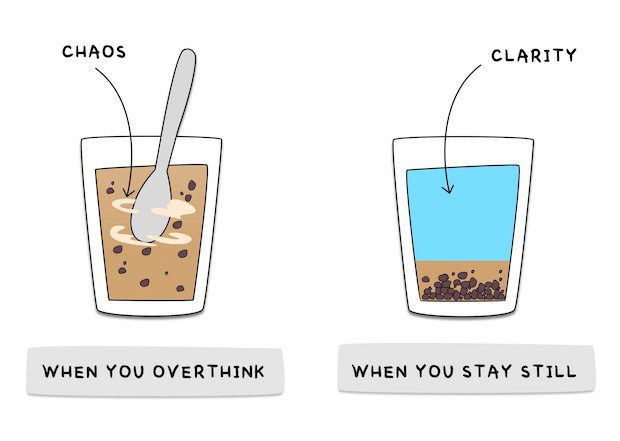I’m not the brightest bloke.
People sometimes think I am because I write a lot. But writing doesn’t make you smart — thinking does. And writing makes you a better thinker, so you seem smarter than you naturally are and appear to have a higher IQ.
Here are some killer psychological ideas I’ve found that can act as shortcuts to a better life.
The power of an anti-vision
Your psychology can often lead you down a dark alley where a murderer waits to slice you up into prime cuts of meat for dinner.
When I think of a vision for my life, it’s near-impossible to know what the right path is. My friend Dan Koe taught me that knowing what you don’t want is an easier way to craft a vision for life.
For example, I never want to go back to an assembly-line cubicle job ever again. So I run my online business with that vision in mind.
I ask myself daily “how the heck do I not go back to the bank cubicle again?” The answers to my problems come easier when I think like that.
You may not know what you want in life. But I’m sure you know what you don’t want. Use that as a compass.
Ask the wrong question to get the right answer
I’m a naughty boy.
When I want to generate discussion around a question or get answers, I purposely put typos or errors in my work. For example, a few years ago I wrote about how success is like a Ferrari.
The publication used a photo of a Bugatti car. The audience lost their minds. This error wasn’t something the average person was willing to overlook. Thankfully, it forced them to read the article, looking for more errors.
By reading the article they got the lessons I was trying to share and helped me answer many tough questions in the comments.
This isn’t a psychological idea I came up with, although I wish I did.
It’s called Cunningham’s Law.
If you want to find the right answer online then instead of posting the right question, share what you think is the wrong answer.
It works because it taps into human nature. The average person can’t wait to become a critic. Let them. Don’t fight it.
The smartest person in the room disease
The Dunning-Kruger effect explains a lot about the world.
(Reminder: it’s not Denning-Kruger. Geeeeezzzzz. Last time I wrote about it a few crazies thought it was my last name.)
Dunning-Kruger is where overconfidence forces people to think they’re smarter and more experienced than they are. If you ever wondered why Donald Ducks could become presidents it’s because of Dunning-Kruger.
Incompetent people think they’re smart, while competent people underestimate their quiet genius. It’s why I wrote that quiet people in meetings are bloody incredible.
The quiet people are the ones who understand Dunning-Kruger. The loud ones who can’t stop talking are the Dunning-Krugers.
Talk less. Be humble more.
The greatest decision-making idea I’ve ever come across
Making big decisions is a pain in the ass.
The decision to have a kid took me years to make. All I could think about was poop-filled diapers and my tracksuit pants covered in baby vomit. Yuck.
Then I got to a position where I oversimplified the whole thing with this question: “If I die and never have kids will I be happy and have no regrets?”
The answer was hell no.
This idea comes from Occam’s Razor. It suggests that the decision with the least amount of assumptions is best. Why? Because you go with your natural intuition and gut feeling.
Occam’s razor prioritizes adding simplicity rather than being trapped by complexity that gets you nowhere and prevents decisions that can move your life forward from getting made.
Become a decision minimalist. Choose simple.
The 10 Reps Rule
The mind loves you to be lazy.
Any friction or resistance causes the mind to tell you “just give up, mate.”
The 10 Reps Rule is a new one I got from Purple Cow author Seth Godin. The idea comes from the gym mindset of lift a weight for as many reps as you can. Even if you do one rep you’ve removed a major psychological barrier.
Put simply, “If you can do it once, you might be able to do it ten times.” Start with one rep and you’ll eventually hit 10 reps.
10 reps is where the task you’re doing becomes a skill or practice. And you’ll do it on auto-pilot once you can do 10 reps. Try this psychological idea out with writing online, exercise, following up, being kinder, etc.
Every habit is made up of reps. Do the reps, hit your goal.
Inaction can lead to magnificent action
Chaos may find you. Inaction and present-moment awareness slow down the hurricane in your mind.

Image Credit-MoinaAbdul via Twitter
The 5-Hour Rule
Fellow writer Michael Simmons came up with this one.
According to his research of the top 1% in their field, successful people spend at least 1 hour a day or 5 hours a week learning or practicing a new skill.
They never stop learning.
Turns out Michael wasn’t the first person to notice the 5-hour rule in action. Ben Franklin did. He used the 5-hour rule to purposely put time on his calendar to learn.
The best time he found was first thing in the morning. That’s where he’d spend time to read and write. Simultaneously he would set goals and track his results. He was the OG of self-improvement for sure.
Learn for 5 hours a week to join the top 1% of your field.
Get a flywheel working in your favor
In psychological terms, a flywheel is a positive momentum loop.
The idea is to find flywheels of momentum in your life that you can get spinning in your favor. Any additional effort you apply to these flywheels compounds exponentially.
Flywheels need the force of intensity to get started. They need duration to create consistency. And they need new angles of intelligence.
Writing online is a flywheel for me. Sending out a weekly newsletter is another one I have. And going to the gym multiple times a week is perhaps the best flywheel for my health.
Search for flywheels you can add to your life. Then put intense force into them for a consistent duration to access unfair advantages in life.
Success takes longer than you think
The moment I quit startup fantasy land and went back to a real job in 2011, I wanted to exit cubicle life. That was my goal.
I didn’t get to quit my 9–5 job until 2021. Ryan Holiday recently shared Hofstadter’s Law. It states that however long you think a goal is going to take, it’ll take longer.
Even if you’re aware of this psychological idea, your goal will still take longer than you think. Don’t fight it. Embrace it. Let it force you to be patient.
Uncertainty is the way
Dan Koe also says that certainty is a virus that has kept so many of us from achieving our goals.
The brain loves certainty. It does everything it can to protect you from uncertainty. It’s often why you re-watch the same movies over and over even though you already know what happens.
The certainty bias is hardcoded into society.
- Predictable paychecks
- Boring traditional career paths
- Standardized school curriculums
- Staying at one company for most of our careers
- Popularized paths to reach success that involves no creativity
The problem with chasing certainty is it’s a trap. It has the most competition and the least likely chance of success.
Those who truly find success have no clue where the path leads. They simply do what they love doing and accidentally find their way by being uncertain about where they’re going in the first place.
Success is a paradox. Chase uncertainty to get certain success when you least expect it.
Lying to yourself let’s you keep going
Let’s finish on a big one.
Famous investor Raoul Pal bought expensive wine and kept it for 15 years.
He wrote off the expense as a sunk cost. Because of this lie he was able to drink these expensive bottles of wine without any guilt. Drinking that wine has brought him enormous enjoyment that money could never buy.
If he didn’t lie to himself the cost of the wine would have made him feel dumb for drinking it and the enjoyment would be lost forever.
I did the same with financial losses. I lied to myself about what they meant. I told myself “Tim, you lost $100K to eventually (probably) make $10M. $100K was the entry price and you’ve paid it. Now get back to work.”
By rewriting the narrative, I was able to keep investing my money over the long term and make far more than the loss. The lie was necessary to recover from loss — or else my future wealth would never have been possible.
Not all lies are bad.
Some lies help you keep going.
You need mental tricks to survive failure, rejection, or loss. Otherwise you drown in guilt and regrets.


